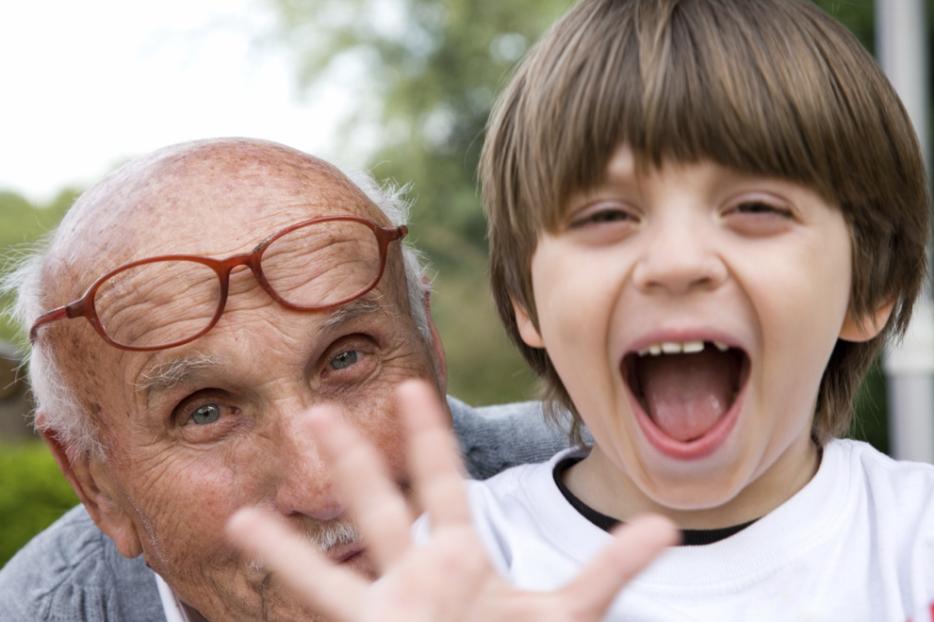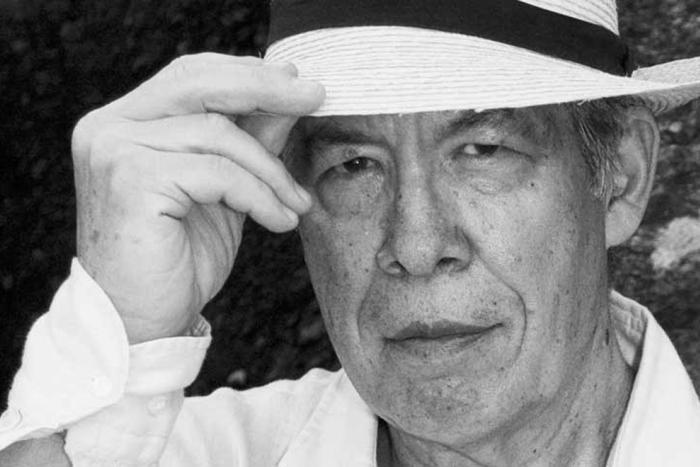I’ve always been curious about and a bit mystified by my friends’ relationships with their grandparents. My mum’s mother lived only a half-hour from us, but she was unwell for most of my life, and I remember her mostly as a rocking chair piled with knitted afghans. My father’s mother lived in Brazil, and would occasionally swoop through trailing jewelry and silk, and just as suddenly disappear in a cloud of perfume. My mum’s father died when I was very young, and my dad’s father was the silent, smoking type—I remember him whenever I get into a car redolent of thirty years’ worth of cigarettes. My only remaining grandparent is my dad’s ex-stepfather, whose Yugoslavian accent is so strong he calls me “Leeeenda, darlink!” which has occasioned roommates to tell me that I have a voicemail from Dracula.
I’ve sometimes wondered if my low level of contact with my grandparents meant I missed something in life. According to researchers at the University of Helsinki, that could be: having grandparents involved in a child’s upbringing can make kids better adjusted and better behaved. The study’s authors, Antti O. Tanskanen and Mirkka Danielsbacka, ground their findings in evolutionary theory, saying that in pre-modern societies, grandparents were key care providers. Grandparental involvement had two main results: “firstly, the investment in grandchildren may have increased their children’s fertility (increasing the number of grandchildren) and secondly grandparents’ investment may have increased grandchild survival (Euler, 2011).”
But this is only the case with maternal grandparents, their study suggests—paternal grandparents with equal involvement have no effect.
Tanskanen and Danielsbacka’s study consisted of a sample of 1488 students with an average age of about thirteen. (Technically, their study is just a new analysis of data previously drawn from these students, but let’s not split hairs.) These students first completed a questionnaire about their emotional and social well-being, agreeing or disagreeing with questions on four areas: emotional symptoms (e.g., “I worry a lot’’), conduct problems (e.g., “I get very angry and often lose my temper’’), hyperactivity (e.g., “I am restless’’), and peer problems (e.g., “I am usually on my own’’).
Then the students completed another questionnaire, this time about their relationship with their grandparents. This one had questions like: “How often do your grandparents look after you?”; “Do they get involved with things you like?”; “Do they come to school or other events that are important to you?” Students identified the gender and lineage (maternal or paternal) of the grandparents they were talking about, and answered a few other questions about their grandparents’ ages and marital statuses.
Tanskanen and Danielsbacka then examined the correlation between the lineage of the involved grandparent and the child’s well-being. They found that when one or both maternal grandparents were involved in a child’s life, the child’s behavioural and emotional problems were likely to be lower than average. When it was an equally involved set of paternal grandparents (or a single paternal grandparent), the involvement didn’t correlate with any diminishment of the child’s behavioural or emotional problems.
The researchers explain why this is consonant with contemporary theories of human evolution. “Difference between maternal and paternal grandparents has been explained with different reproductive interests: a daughter is not replaceable but a daughter-in-law is.” (Harsh words, kind of. I don’t have in-laws, and I’m not sure I want any if this is what’ll be going through their reptilian brains.) “It is in the paternal grandparents’ fitness interests to exploit the fertility of the daughter-in-law. By contrast, it is in the maternal grandparents’ interests to increase their daughters’ well-being for example by lengthening the birth intervals which can increase the survival probability of her already born children. Thus, maternal grandparents and matrilinear kin in general are expected to increase child survival more than paternal grandparents and patrilineal kin (Euler, 2011; Mace & Sear, 2005).”
Tanskanen and Danielsbacka also offer what, they note, is a controversial idea being currently bruited about in evolutionary theory circles: that women’s long post-menopausal lifespan (in most animals, reproductive and other systems decline around the same time) may have come about so that they would be available to care for grandchildren.
I have to say, I found these results extremely surprising (unlike the researchers, who had predicted them from the outset). And now I feel sort of bad for paternal grandparents—even when you go to the trouble of going to your son’s kids’ soccer games and knitting them booties and taking them swimming and so on, as far as a positive effect on the kids goes you could have been sitting on your front porch drinking bourbon the whole time? That seems like a rip-off. But my maternal grandparents will be glad to know (in whatever austere Dutch Calvinist heaven they’re in) that their influence might have made me a better person.






